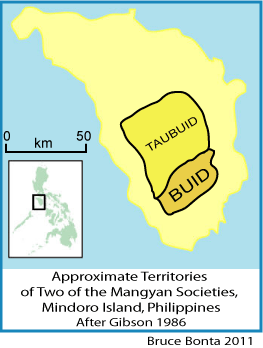Yagay Sebastian, a Buid leader, is discouraged. “First the lowlanders invaded our land and forced us to move to the highlands and now we might be driven out again,” he says. “Only this time we have nowhere to go.”
 The Buid, also often spelled Buhid, are one of the seven indigenous groups living in the highlands of Mindoro Island in the Philippines, which are collectively known as “Mangyans.” While they do not share common languages, they are united by the fact that they all feel discriminated against by the lowland Filipino people and their government agencies.
The Buid, also often spelled Buhid, are one of the seven indigenous groups living in the highlands of Mindoro Island in the Philippines, which are collectively known as “Mangyans.” While they do not share common languages, they are united by the fact that they all feel discriminated against by the lowland Filipino people and their government agencies.
Plan, an NGO based in the United Kingdom that advocates for children in poor countries, posted a news story on its website last Friday about the efforts of the Mangyan societies to defend their rights to their lands. The leaders of these tribal communities, according to Plan, are deeply concerned about their future, an issue that has been featured by news stories from the Philippines last December and again in May this year.
Juanito Lumawig, the chair of the Pantribong Samahan ng Kanlurang Mindoro (PASAKAMI), a federation that represents the Mangyan societies, told Plan he is deeply worried about the situation. “We are petrified that big mining companies will take over our ancestral land. If the government gives them license to operate, our land and heritage will be lost forever,” he says.
The Plan article indicates that the Mangyan groups claim over 40,000 hectares of mostly forested land as their ancestral territories. The difficulty is that the government of the Philippines requires the Mangyans to document their ownership of the lands they claim, a difficult task for people who mostly do not read and write, who lack written deeds or documents, and who have only limited contact with outsiders. Many Mangyans lack birth certificates or other identity documents, making them even more vulnerable to aggressive lowlanders.
One major reason for their difficulties is that their mountainous territories contain deposits of gold and other valuable minerals. But despite the underground wealth, the Mangyan peoples, including the Buid, are very poor. The average earning power of a Mangyan family is about $0.34 per day. Their drinking water is often not safe, and they are, according to the Plan story, frequently faced with periods of hunger.
Plan indicates that it is helping the Mangyan peoples secure titles to their lands, so far with some success. The organization has been working in Mindoro since 2005. It is creating 3D maps and using the oral histories of the people, which have many references to major landmarks, to help them prepare their claims for deeds to their properties.
Lumawig, the Mangyan leader who is from the Taubuid society, a group immediately to the north of the Buid, indicates that some of their people have been bribed into signing away their land rights. They feel quite helpless—powerless, he says, and frustrated. But, the article continues, they express their frustration and dissent, like their forests, in a peaceful manner. “Non-violence is part of our beliefs,” he says. “Our ancestors told us that God created the forests for the Mangyan. I am sure they will protect us.”